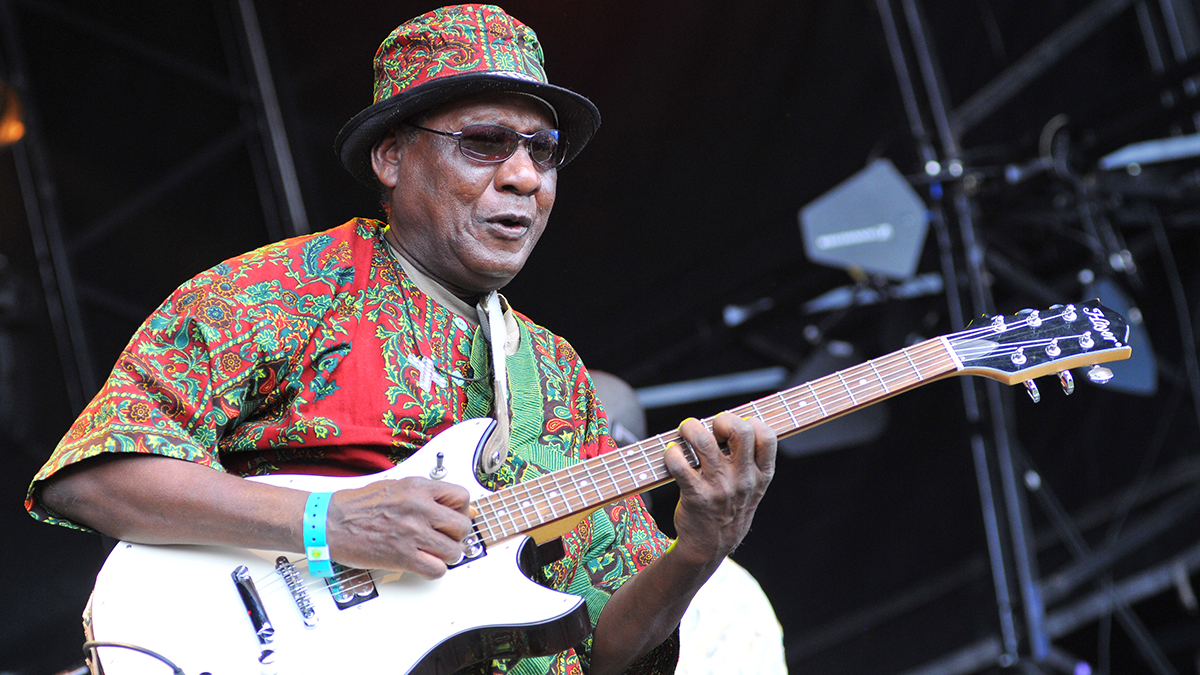Best acoustic guitar amps: let your acoustic tone shine
Our expert pick of acoustic amplifiers for all budgets, from Boss, AER, Fender and others
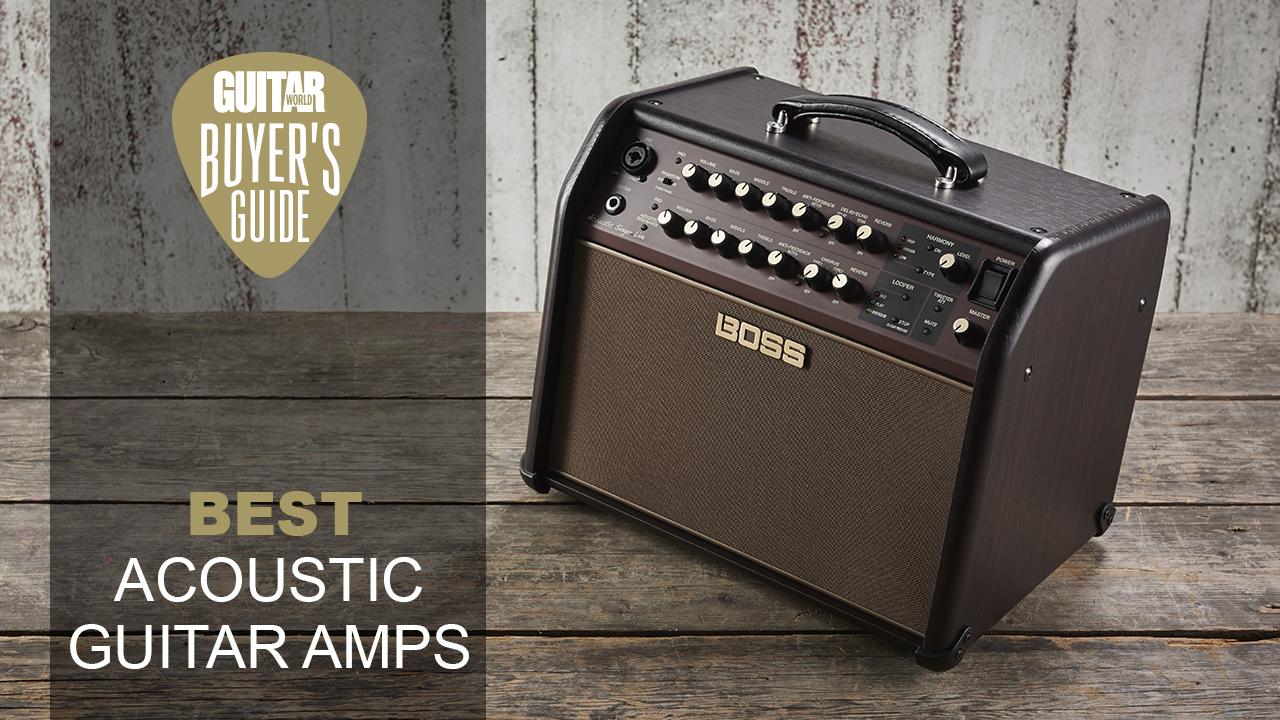
All the latest guitar news, interviews, lessons, reviews, deals and more, direct to your inbox!
You are now subscribed
Your newsletter sign-up was successful
Acoustic guitars are designed to project their sound, with centuries of innovation that make them loud and proud, but no matter how loud an acoustic goes, there will always be occasions where they can’t quite compete with their electrified counterparts. This is where the best acoustic guitar amps comes into play.
Acoustic amp are optimized to amplify the characteristics of acoustic guitars and project them through their built-in speakers and often out through a PA system via their DI outputs, when even more volume is needed. This makes them super valuable for gigging musicians who need a little more oomph, be that for street performers whose sound can be lost outside, or on the stage where an acoustic struggles to compete with a drum kit.
As with electric guitar amplifiers, acoustic amps can range from entry-level at accessible price points, to professional standard. If you’re in need of a little more grunt from your acoustic, but are unsure which amplifier suits your needs, read on to find the best acoustic amps you can buy at every price point.
Our top picks
The very best acoustic amplifier you can buy right now is the Boss Acoustic Singer Live, as it delivers everything you could need in terms of functionality, with some amazing Boss effects thrown in, at a price which we feel is extremely sensible. The Boss Acoustic Singer might not look the most exciting compared to the Blackstar Sonnet or Fender Acoustic Pro, but for sheer sound and practicality, it is the perfect choice for us.
For the best premium option, the AER Compact 60 is a compact, but powerful acoustic amplifier that is revered by professionals. Expertly engineered and tastefully equipped with all the features you’re likely to need, it is the reigning champion of pro-grade acoustic amplification.
If you're looking for something more affordable, the compact Orange Crush Acoustic 30 would be a wise budget choice. It has separate inputs for both a guitar and a microphone and separate EQ sections for both, making it ideal for home practice or small gigs.
Best overall
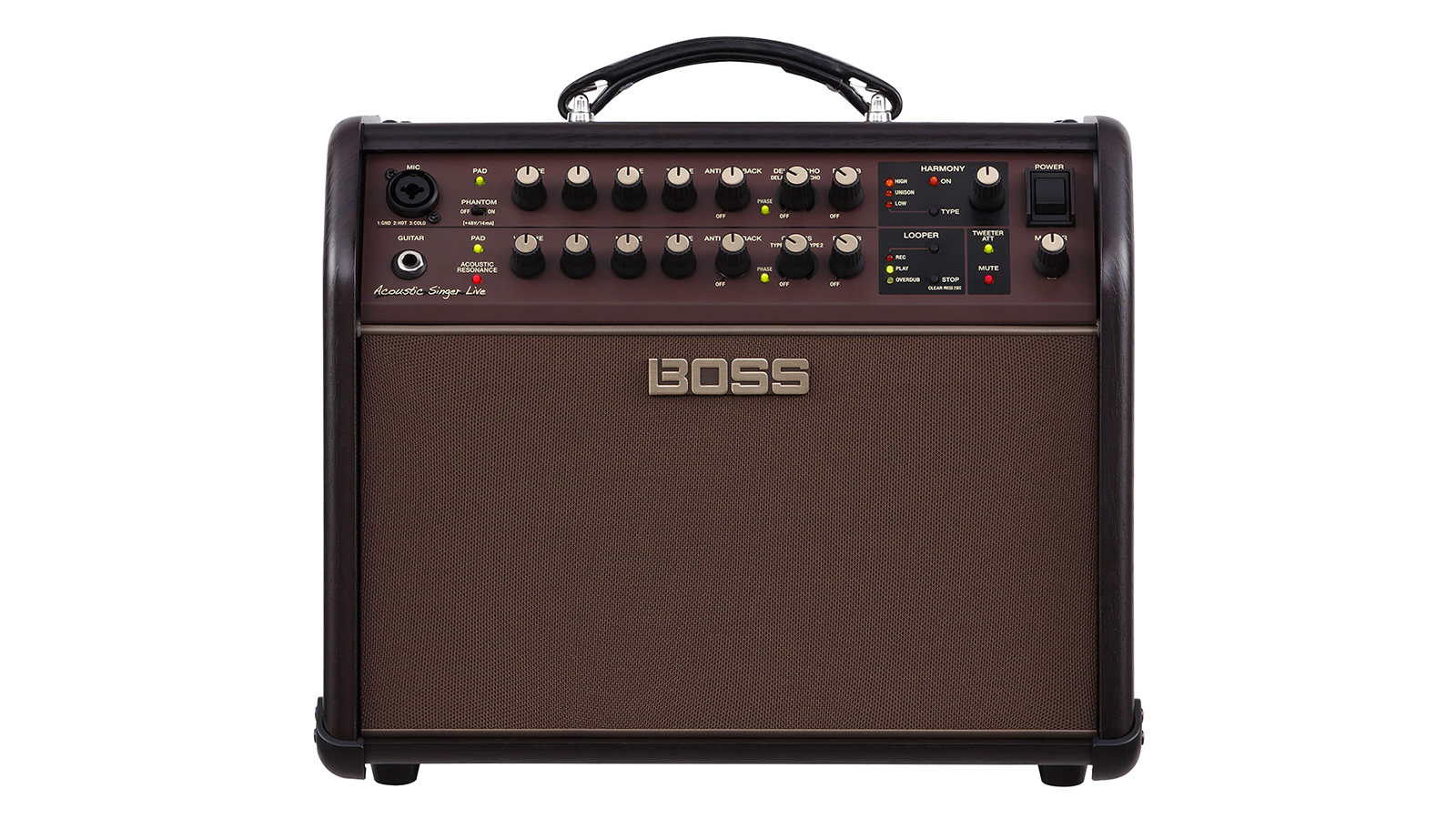
1. Boss Acoustic Singer Live
Our expert review:
Specifications
Reasons to buy
Reasons to avoid
As an all-in-one tool for the gigging singer-songwriter, the Boss Acoustic Singer Live takes some beating. This amp combines two separate channels – one for guitar and one for vocals – and throws in a bunch of genuinely useful tools. We loved the built-in looper, in particular, for creating those Ed Sheeran-esque solo sessions, while the included effects sound as good as you would expect from Boss.
There isn’t much to dislike about this amp. It does what it promises very well, has a few neat tricks, plenty of connectivity and a superb sound which removes some of that inherent toppy piezo style tone.
Read our full Boss Acoustic Singer Live review
Best for pros
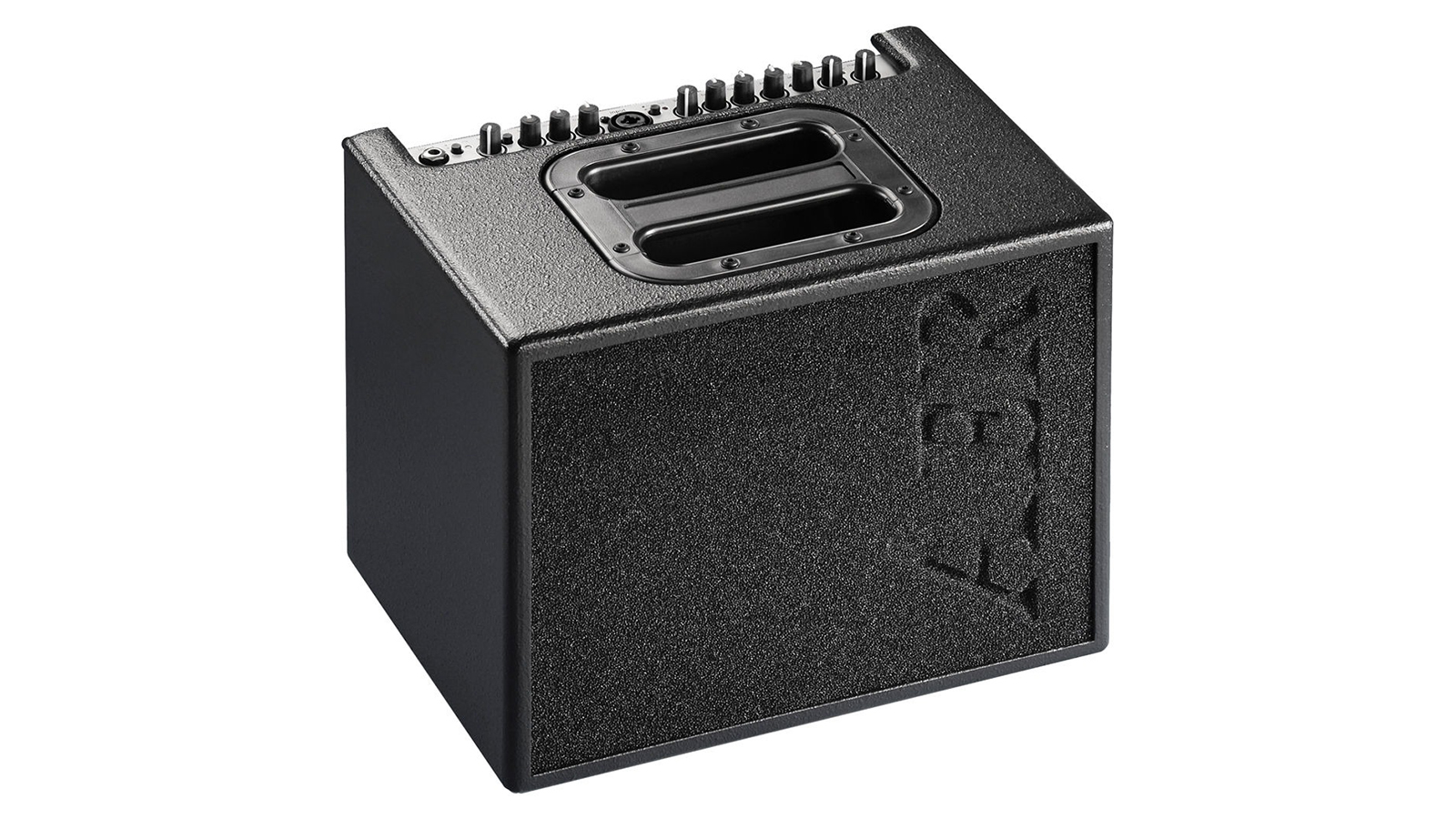
2. AER Compact 60
Our expert review:
Specifications
Reasons to buy
Reasons to avoid
The AER Compact 60 is one of the best-known acoustic guitar amplifiers on the market. Now in its fourth generation, it offers users two separate channels – one with XLR and one with jack – meaning it’ll suit singer-songwriters perfectly, while the dedicated EQs for each section mean you can get things sounding the way you want them.
A small selection of useful onboard effects, including two reverbs, delay and chorus, mean you can add some sparkle to your sound, and the included gigbag means you can protect it from knocks and scrapes as you travel between performances. All told, a very grown-up amplifier with a few real touches of class.
Best on a budget
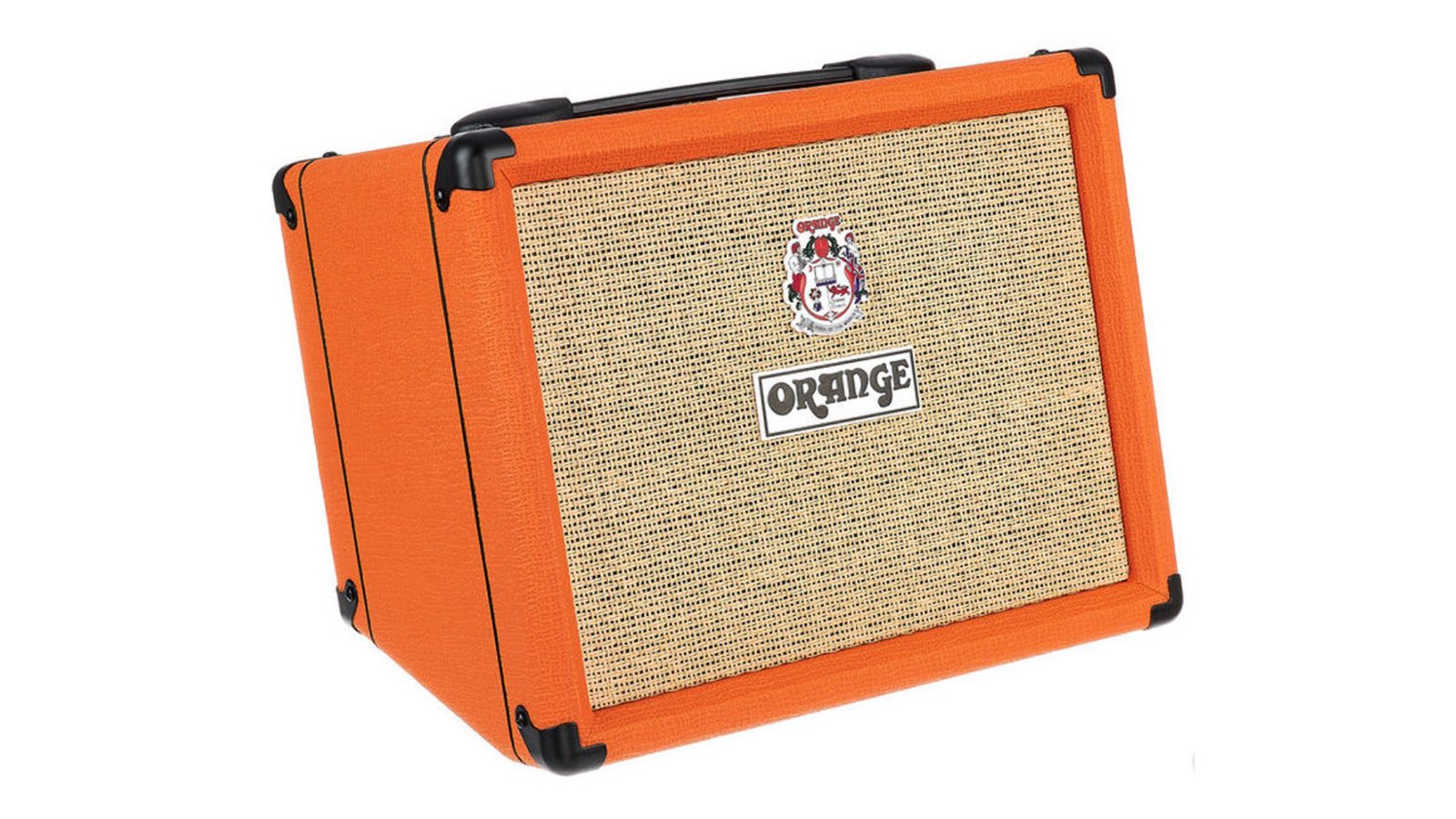
3. Orange Crush Acoustic 30
Our expert review:
Specifications
Reasons to buy
Reasons to avoid
Orange certainly knows a thing or two about electric guitar amplifiers, yet with the new Orange Crush Acoustic 30 the British brand has applied its considerable talents to the world of acoustic guitars. There are some visual flourishes Orange fans will be instantly familiar with, like the famous orange tolex (there’s also a black version) and graphics on the top panel, but otherwise this is an entirely new beast.
The Crush Acoustic 30 is a two-channel amp with separate inputs for both a guitar and a microphone, along with separate EQ sections for both and a couple of nice effects thrown in for good measure. As a home practice amp, the Orange Crush Acoustic 30 is a great choice, but medium to large gigs might be a stretch too far for it.
Best for Bluetooth
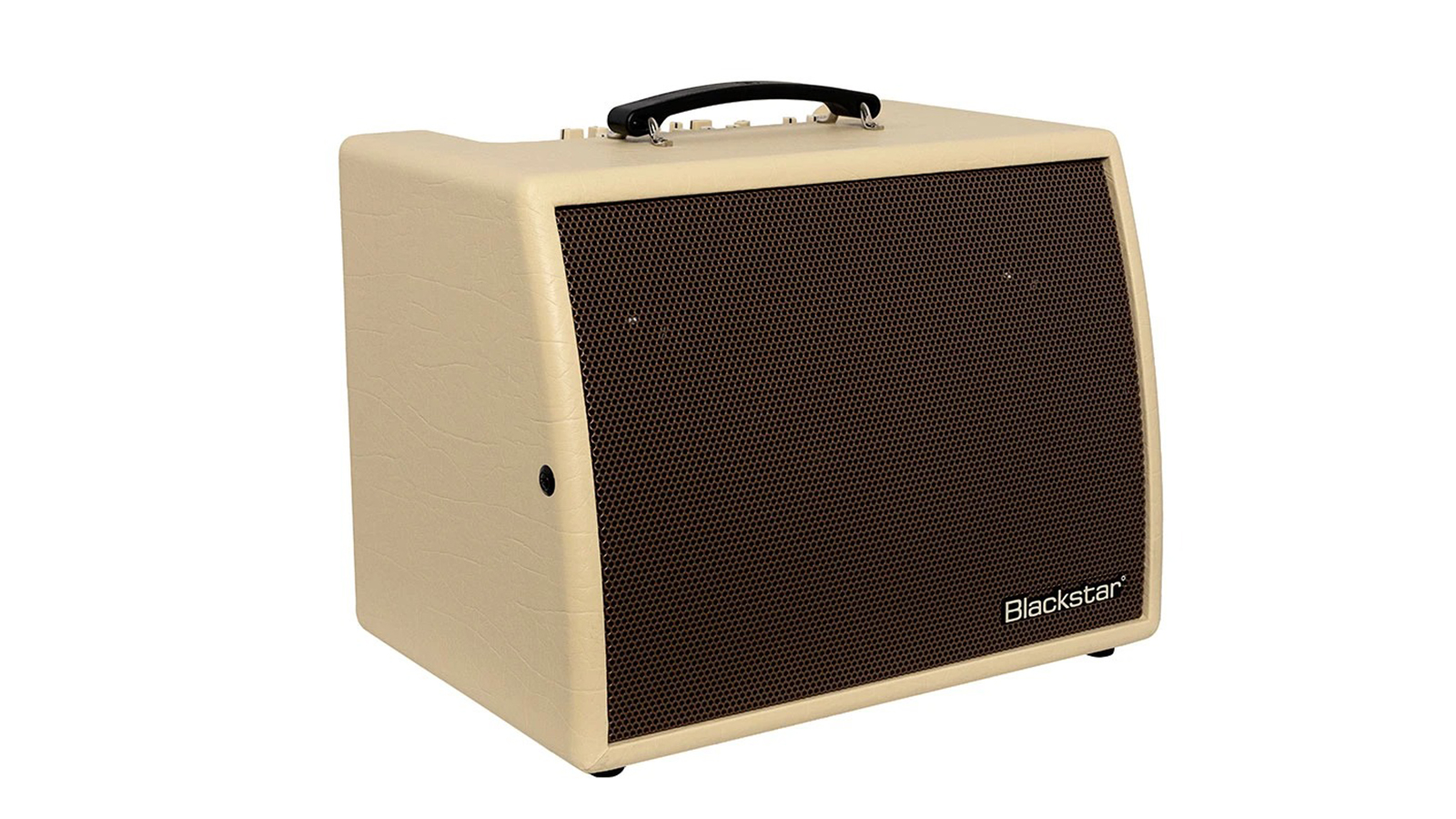
4. Blackstar Sonnet 120
Our expert review:
Specifications
Reasons to buy
Reasons to avoid
We’re big fans of Blackstar here at Guitar World, yet we’ve always felt there was room for an acoustic amp in their range. Step forward the Blackstar Sonnet 120, which is the brand’s take on a two-channel acoustic guitar amplifier which comes with plenty of interesting tricks up its sleeve.
Tonally, Blackstar has aimed to make the Sonnet range as transparent as possible, focusing instead on projecting the natural sound of your guitar. We were particularly taken with the Bluetooth connectivity, making it ideal for playing along to backing tracks, while the four different reverbs each added a nice polish to our sounds.
Best for style
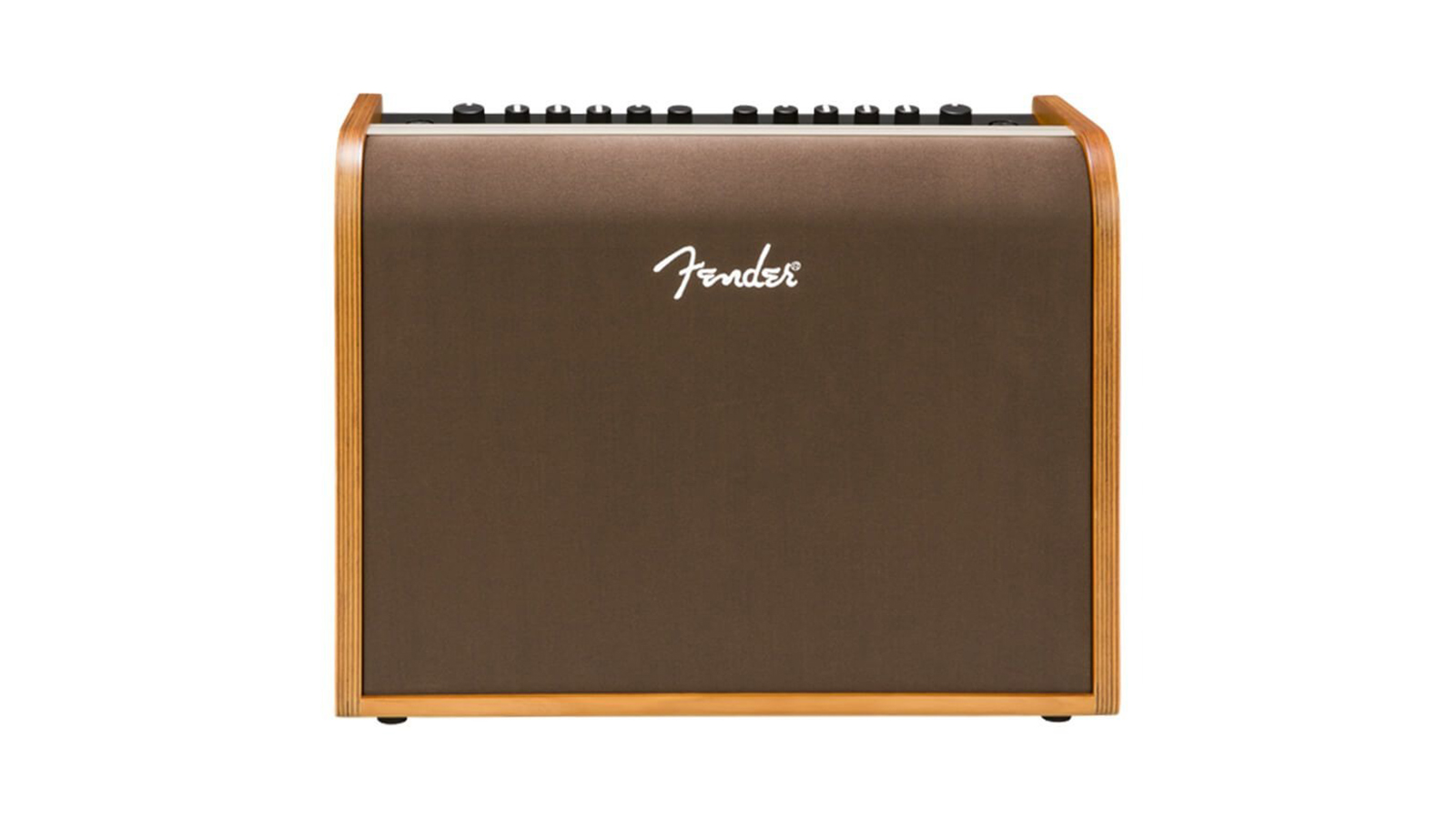
5. Fender Acoustic 100
Our expert review:
Specifications
Reasons to buy
Reasons to avoid
Old Fender acoustic amplifiers, like the Acoustasonic, were great at what they did, but man they were ugly. Step forward the Fender Acoustic 100. Looking more like an example of Scandinavian furniture than a piece of music gear, the Acoustic 100 packs in enough power and performance to make it ideal for large gigs.
We particularly liked the Bluetooth connectivity, meaning it makes use of the 8” flat frequency speaker and allows you to stream backing tracks from your phone or tablet. It’s a large amp, no two ways about it, but it is a good place for anybody looking for a decent, gig-ready acoustic amp to start.
Best for simplicity
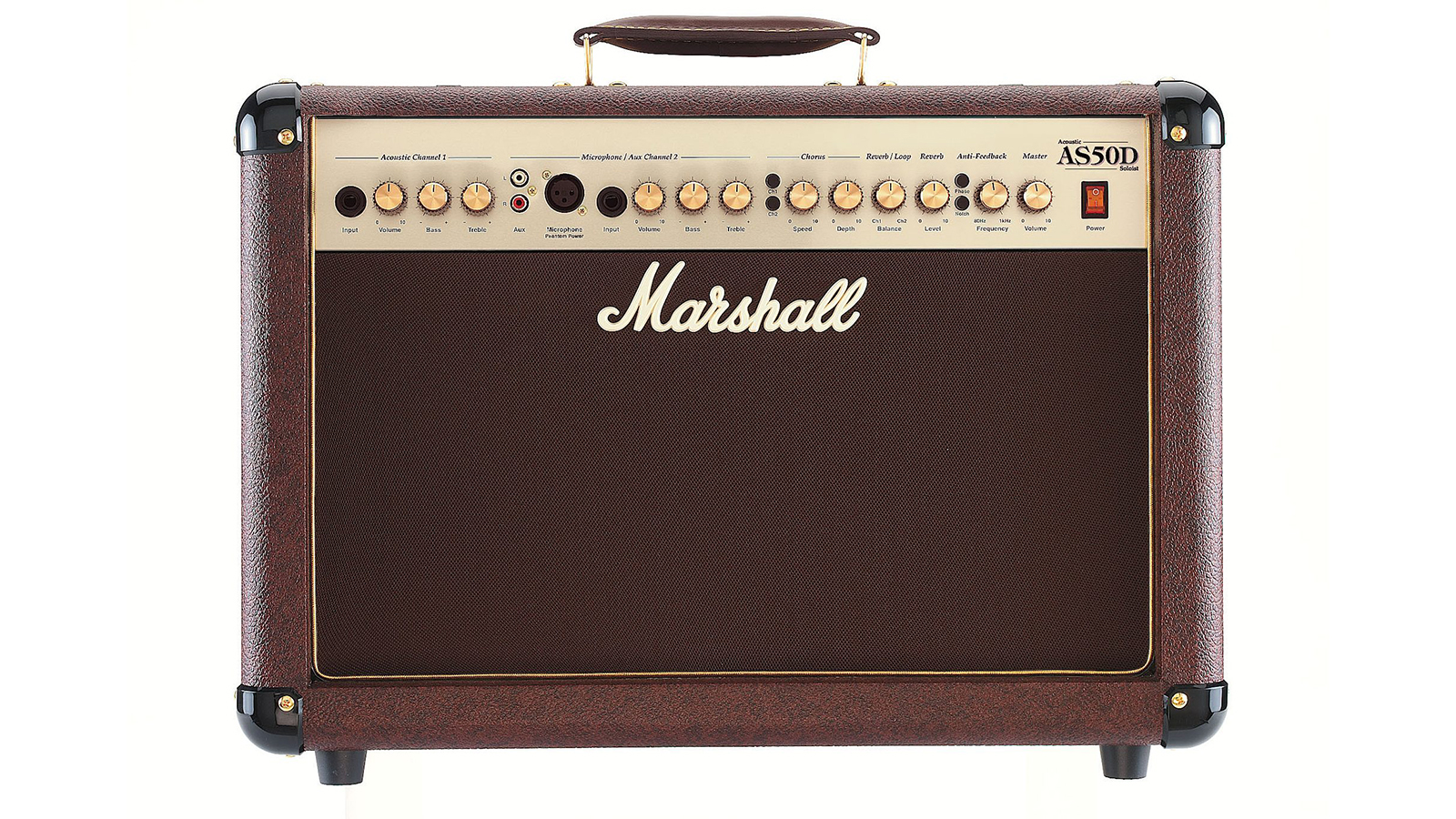
6. Marshall AS50D
Our expert review:
Specifications
Reasons to buy
Reasons to avoid
The Marshall AS50D has been a great-looking and sounding acoustic amplifier for a number of years, and whilst it is starting to show its age, it’s still a superb option. At 50 Watts, you may not achieve stadium volumes, however its dual 8” speakers pack enough punch for most occasions and with a DI out, you can easily plug into the front of house speakers and fill any space.
Rather than loading the amp full with mountains of features, Marshall has been tasteful, choosing to add only reverb and chorus as effects – all you really need – but equipping the AS50D with an effects loop so the user can expand to their desire. The addition of an "anti-feedback" control is also particularly useful.
Going for fewer features, but all being high quality is why this amp has stood the test of time. To top it all off, it comes in at an attractive price point, and its star quality is trademark Marshall good looks… though you pay for those looks in weight, as despite its fairly small size, it isn’t the lightest.
Best for playing solo
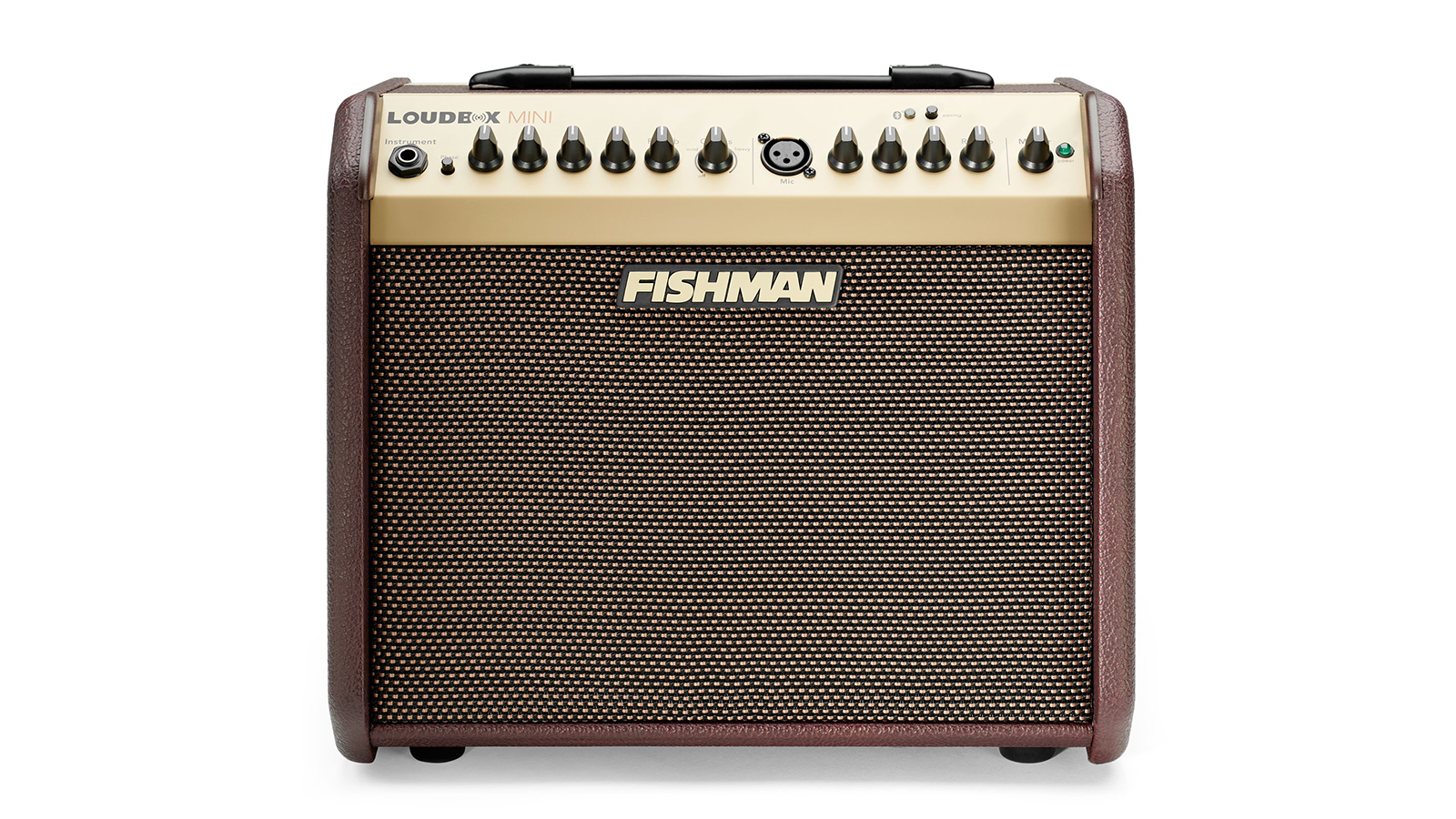
7. Fishman Loudbox Mini
Our expert review:
Specifications
Reasons to buy
Reasons to avoid
Fishman is a big name in the acoustic world, mostly on account of its famous acoustic guitar pickups, however with the Loudbox Mini it has proven it knows a thing or two about amplification too. The Fishman Loudbox Mini is a compact, simple to use, two-channel acoustic amp which would be ideal for solo performers.
We found it to be incredibly versatile, on account of the Bluetooth connectivity and additional 1/8” jack input, while it could feasibly support you at any sized gig thanks to the XLR DI output for connecting up to PA systems. Hard to find fault here.
Best for home
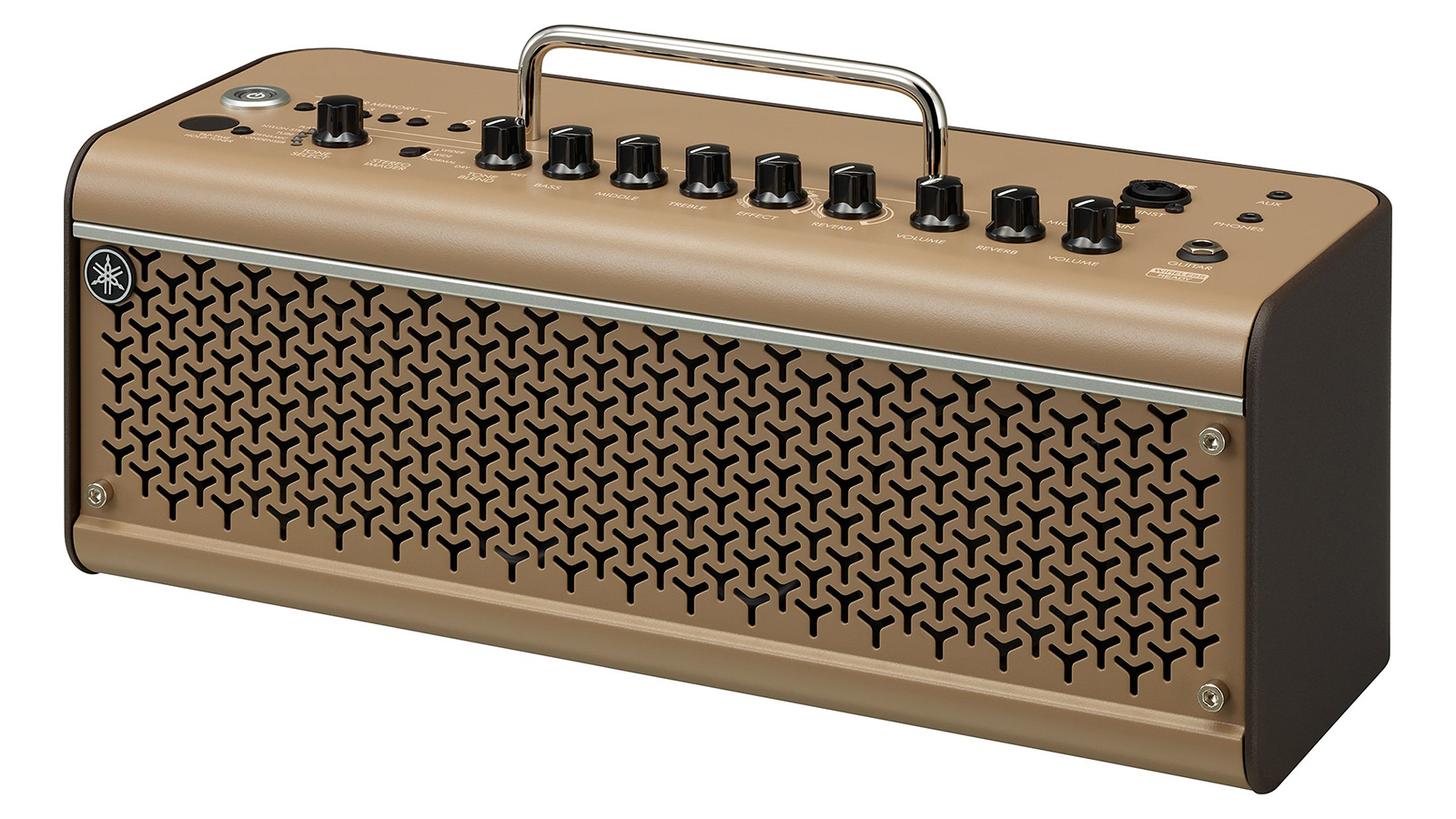
8. Yamaha THR30IIA
Our expert review:
Specifications
Reasons to buy
Reasons to avoid
If you want an amp for home use, or for very small events, this could be the one for you. Yamaha’s THR series revolutionized the desktop amplifier and they have continued pushing boundaries with their THR30IIA acoustic amp; a model specifically optimized for acoustics. Its stereo speakers give gargantuan amounts of width, despite its diminutive, desktop-friendly size, especially when utilizing its inbuilt reverb and delay effects that expand your sound beyond what seems plausible for a compact amplifier.
Some may question the lack of built-in effects, but it offers everything you’re likely to need with no baggage, opting for quality over quantity. Five different memory slots allow you to craft tones to your liking and store your sounds ready for easy access.
Just its looks alone are reason to buy it. If you’ve got a beautiful acoustic, then this is a great amp to pair with it; retro and modern in equal parts and something you can be proud to have on your worktop. You do, however, pay for those good looks, with this coming in at over $500.
Best for effects
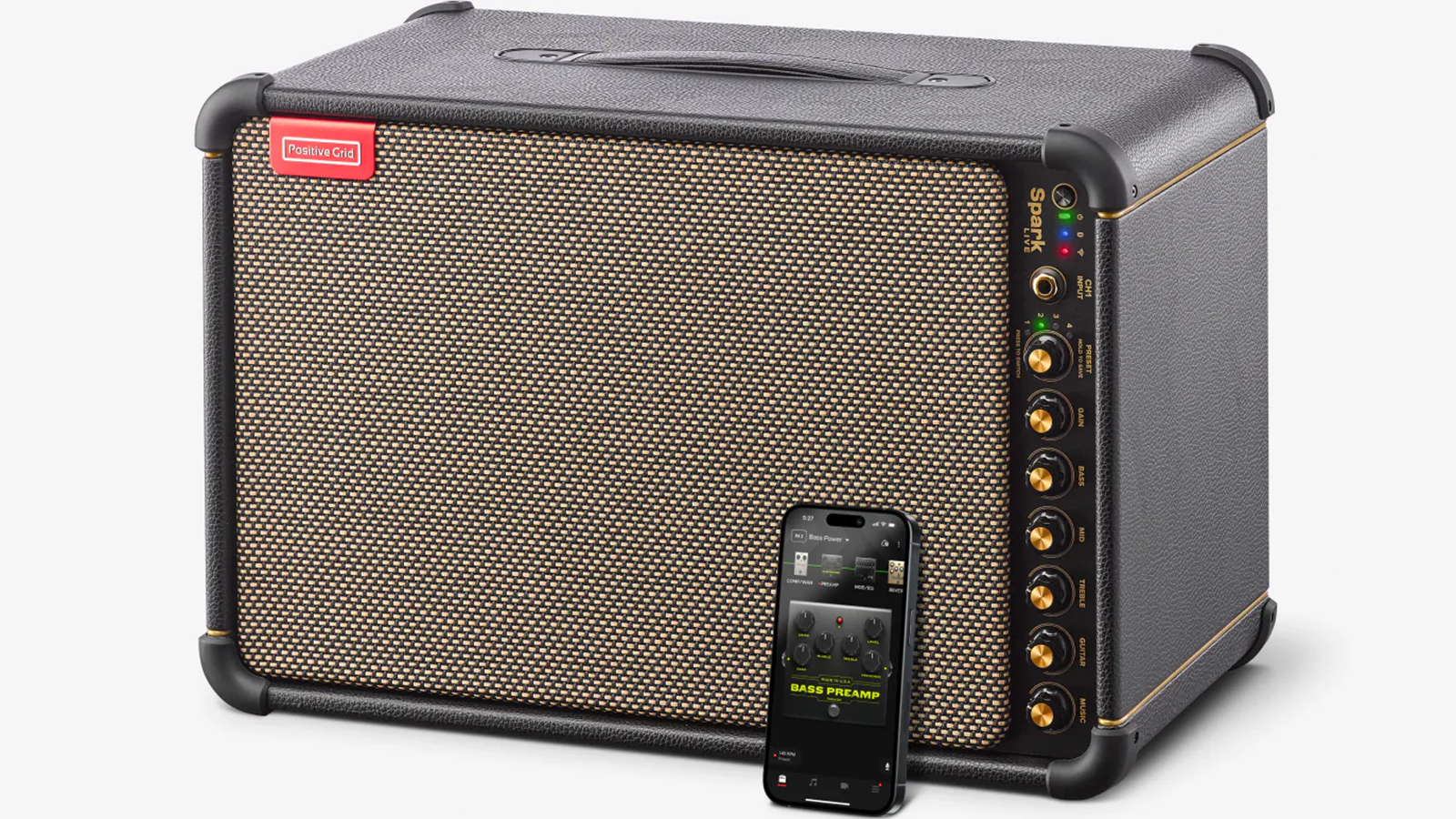
Specifications
Reasons to buy
Reasons to avoid
With four channels, the Spark Live can almost be considered as a super smart, compact PA system, with each channel optimized for particular instruments. Channels one and two have amp models for acoustic, giving you multiple options for tones. And options is where the Positive Grid Spark Live excels, as there are also 43 effects on channel one and 50 on channel two, ranging from reverbs, to delays, to distortions and modulation.
The Spark Live is a solo performer’s dream rig, available with or without built-in batteries, allowing you to take this with you wherever you go, making it perfect for use outdoors, or at small parties/events. Some may find the Spark Live offers too much, with much of its technology shared with the extremely popular original Spark and Spark Mini amplifiers. Whilst it is intuitive to use, if you’re looking for the very simplest acoustic amplifier, this may not be best for you, but those who like to experiment with different tones should seriously consider this.
Read our full Positive Grid Spark Live review
Buying advice
Why should I consider an acoustic guitar amp?
If you play both electric and acoustic guitars, you may be considering, ‘why do I need an acoustic amp if I already have an electric amp?’ – a fair question! The majority of electric guitar amps aren’t optimized for acoustic guitars, though some modeling amps feature an acoustic preset, for example the Boss Katana has a specific setting for acoustic guitar.
Unlike electric guitars, where you will want the guitar and amp to compliment each other and accentuate each other’s qualities, an acoustic guitar already has bags of sonic characteristics and an acoustic amplifier’s job is to faithfully reproduce these at louder volumes with a flat response, so it doesn’t color the sound. Good acoustic amps should have some kind of EQ, so you can attenuate specific frequencies that may be too prominent when amplified, however unlike a classic tube amplifier where you want all of its lovely harmonic characteristics, the main driver of your tone should be the guitar itself.
Do I need an acoustic pickup to use an acoustic amp?
An acoustic amplifier will require a signal sent to it to amplify in the same way that an electric amp needs one. Many acoustic guitars can be bought with pickups already installed, or if you have an acoustic already, you can buy an aftermarket acoustic guitar pickup and install it yourself.
The type of pickup you might use on your acoustic guitar can vary, but typically they will be active – requiring an external battery. A popular option is a piezo pickup that sits under the saddle and produces a distinctive, bright sound. Some more complex pickups may also pair a small condenser microphone that can be blended with the pickup. And finally you have acoustic guitars with more ‘traditional’ magnetic pickups, which produce a warmer sound.
All of these pickups can work with acoustic amplifiers, but will have some bearing on your sound. For a magnetic pickup, it may be that your tone lacks brightness, however this is where a good acoustic amplifier can help balance your tone, using its EQ to produce a rounder sound.
What size amp do I need for an acoustic guitar?
You may notice that acoustic guitar amps tend to be smaller than their electric equivalents. To reproduce the full high fidelity, flat range sound of an acoustic, acoustic amplifiers tend to utilize a series of smaller speakers rather than one or more larger speakers as electric cabs do. Larger speakers can produce a lot of low-end, which can manifest as feedback in your acoustic guitar, which will be much more susceptible to this than solid-body electric guitars.
Bear in mind that your acoustic should produce a fair amount of sound itself, so a huge speaker stack, as you might expect to see for electric guitar, probably won’t be necessary. If you’re playing a gig, you will likely also have your acoustic sent through the PA, either by having a microphone in front of the guitar, or through a DI box.
Most high-quality acoustic amplifiers will have a DI out, so the sound engineer can simply plug a cable into your amp and get an identical sound that they can play through the PA, which means you can be sure what you sound like out front. So when considering an acoustic guitar amplifier, it’s worth thinking about when and where you will use it, because a diminutive acoustic amp might still pack the punch you need.
How we choose products
Here at Guitar World, we are experts in our field, with many years of playing and product testing between us. We live and breathe everything guitar related, and we draw on this knowledge and experience of using products in live, recording and rehearsal scenarios when selecting the products for our guides.
When choosing what we believe to be the best acoustic guitar amps available right now, we combine our hands-on experience, user reviews and engage in lengthy discussions with our editorial colleagues to reach a consensus about the top products in any given category.
First and foremost, we are guitar players, and we want other guitarists to find the right product for them. So we take into careful consideration everything from budget to feature set, ease of use and durability.
Find out more about how we make our recommendations and how we test each of the products in our buyer's guides.
Read more:
You can trust Guitar World
- The best acoustic guitars for beginners: easy strummers for new players
- Transform your tone with the best acoustic guitar pedals
- The best acoustic guitar strings: our complete guide
- The best guitar capos: our top recommendations for acoustic and electric
All the latest guitar news, interviews, lessons, reviews, deals and more, direct to your inbox!
Chris Corfield is a journalist with over 12 years of experience writing for some of the music world's biggest brands including Orange Amplification, MusicRadar, Guitar World, Total Guitar and Dawsons Music. Chris loves getting nerdy about everything from guitar gear and synths, to microphones and music production hardware.

